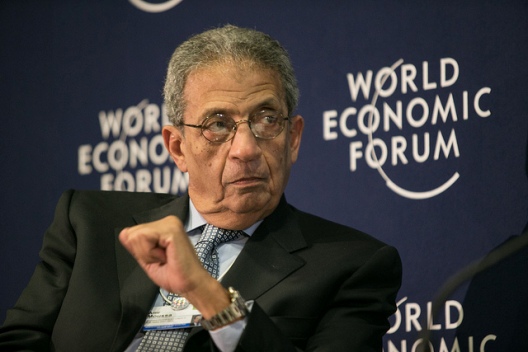 In a conversation on the Egyptian constitution with the Atlantic Council’s Rafik Hariri Center for the Middle East, Amr Moussa, head of the Egyptian Constituent Assembly, expressed optimism for the future of democracy in Egypt and its constitution, despite the many challenges the country faces as it moves forward. Via Skype, Moussa discussed the drafting process and his hopes for a clear constitution, free of “controversial articles,” that will pass easily in a referendum and propel Egypt into modernity and democracy. Though they covered an array of issues, Moussa’s remarks did not stray far from the content of official statements released by the Egyptian government.
In a conversation on the Egyptian constitution with the Atlantic Council’s Rafik Hariri Center for the Middle East, Amr Moussa, head of the Egyptian Constituent Assembly, expressed optimism for the future of democracy in Egypt and its constitution, despite the many challenges the country faces as it moves forward. Via Skype, Moussa discussed the drafting process and his hopes for a clear constitution, free of “controversial articles,” that will pass easily in a referendum and propel Egypt into modernity and democracy. Though they covered an array of issues, Moussa’s remarks did not stray far from the content of official statements released by the Egyptian government.
Moussa spoke of a break from the emphasis on religion present in the last constituent assembly and resulting constitution. In the new constitution, citizenship, regardless of race, religion, or creed, will be most important. In addition, Moussa explained that in this constituent assembly, fifteen out of fifty members represent religious interests (including the Coptic minority), and the remaining members are split among liberals, women, and other interest groups such that no one faction dominates the drafting. He noted that the Freedom and Justice Party, the party of the Muslim Brotherhood, declined to send a representative to the committee, but one former Brotherhood member sits on the committee. Moussa also predicted that the constitution will include an article that prohibits the establishment of parties based on religion. Instead, parties should be focused on political issues.
The new constitution will protect Egyptians’ freedoms of expression and assembly, and will provide for a robust civil society, Moussa said. He noted that free expression and peaceful demonstrations are “a matter of principle” and comprise “the essence of the revolution.” Civil society coupled with privately owned (rather than state-sponsored) media outlets will be an “essential part of building public opinion” in Egypt. Further, Moussa encouraged diverse political factions to come to Cairo and lobby for their interests in front of the Constituent Assembly. This will ensure that the constitution addresses the needs of as many Egyptians as possible.
The conversation also dealt with the role of the military in the drafting process as well as in Egypt’s future. Moussa stressed that civilians will be subject to a judicial system separate from that of the military, except perhaps in special cases involving military personnel. Moussa denied that minister of defense, General Abdel Fattah al-Sisi asked for specific provisions in the constitution to protect his status. However, the constituent assembly was and will continue to receive representatives from the military to consider their wishes, just as the assembly is doing with all interest groups. When asked about the future of parliamentary oversight of the military, Moussa explained that it is an important aspect of democracy, but one that will have to be implemented gradually.
The state’s campaign against terrorism raised questions, but Moussa explained that the constitution is meant to be a permanent document to enshrine democracy for generations to come, and thus would not deal with what he hopes is the temporary threat of terrorism. The government is responsible for protecting Egypt from terrorism, he said, not the constitution.
Moussa also stated that decentralization of the government and strengthening local democratic bodies would be a gradual process that could not be achieved overnight. He explained that “decentralization will appear clearly in the draft constitution” but then said that elections for mayors and governors would have to be implemented over a period of years.
Members of the committee of fifty responsible for drafting the constitution are still debating several controversial articles, but Moussa expects that a referendum and eventual elections will proceed according to the timeline of the transitional roadmap. According to Moussa, Egypt will need the help of the international community, but will successfully usher in democracy and inclusiveness.
Julia Fusfeld completed her Bachelor’s degree at Dartmouth College in government, and is currenty an intern at the Atlantic Council’s Rafik Hariri Center for the Middle East.
Image: Photo: World Economic Forum
